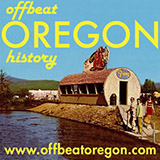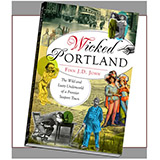MY STORY
See Orcas Island and die
The adventure that was Summer 2006 in the most beautiful place on earth, and how I almost ended up staying there permanently
By FINN J.D. JOHN
November 2008
It was an unseasonably bright and cheery Saturday morning when I arrived at my new home on Orcas Island and looked down from the brow of the hill at the Death Pile.
Now, I'm no logger. But I did grow up in a town that buttered its bread cutting timber, and washed it down with Blitz-Weinhard Beer paid for the same way. I know a death pile when I see one. That morning, I saw one.
It looked like a blow-down from a hurricane or massive storm: trees dropped in every direction, piled on top of each other, like so many jackstraws sprinkled thickly over a living-room floor that just happened to slope at about a sixty-degree angle into Puget Sound.
And it was my job to pick them up -- the little boy who'd sprinkled them there had taken his chainsaw and gone home.
It was about that time that a gnawing realization started to grow in the pit of my stomach: I was doomed. I'd signed up for something I couldn't do. At best, I'd pay for my folly with my reputation. At worst, I'd end up quietly bleeding to death under one of those logs, over a windswept bluff on the westernmost edge of Orcas Island, maybe staring out to sea at Canada. My last words would probably be lyrics from an old Jimmy Buffett song about how it was my own damn fault.
But to be fair to myself, it had seemed like a dream -- almost one of those situations that those who believe in direct divine intervention say is "meant to be." Four months earlier, there I'd been, moping around the house collecting unemployment. Things at The Springfield News had gone very sour very quickly after the unlikably unctious man from Nickel Ads took over. One of the first things he'd done was roll the publisher's head and promote the newly arrived, inscrutable advertising manager to take her place. It wasn’t the sort of thing that ends well, and it didn’t, although it could easily have ended worse.
So in the course of my job hunt, I found an opening on Orcas Island. It sounded like a dream: I’d be replacing the legendary editor who bought the paper in 1969 from its founder. He’d be there to help me get my bearings. The publisher was a charming and driven New York ad-agency refugee -- the sort who, 30 years ago, would have worn white linen gloves and smoked Virginia Slims in a 12-inch Bakelite cigarette holder. On my visit to interview there, everyone waved at one another as they drove by on the roads. I stopped in Tacoma on my way to the island and bought two dozen Krispy-Kreme doughnuts. I was offered the job.
It got better. Elyse, the aforementioned publisher, had a line on a home I could rent. It would cost me $600 a month – a pittance on the island, where a single-wide trailer on a city lot would fetch $300,000 – plus 20 hours a week working on cleaning it up. It was five acres of “high-bank oceanfront” facing due west. For anyone who appreciates a good sunset, it was a dream home, perched on the rocky brow of the hill and looking out over Saturna Island in Canada. Sunsets in the summertime bathed the living room in pastel-colored light from 8:30 to 10:30 p.m.
To get to it, one drove through the tiny hamlet of Deer Harbor, Wash. Deer Harbor’s population was under 100, and included two marinas, a boatbuilding shop and a post office. One drove across a short wooden bridge at the back of the estuary that formed the harbor before passing around the waterfront and diving back into the woods, where – if one was lucky – one got to smell coffee being roasted at the Local Goods Roasters shed by the road where the pavement ended.
Corny as it seemed (and seems!), I couldn’t help thinking of Cabot Cove, the fictional home of “Jessica Fletcher” on “Murder, She Wrote.”
The house itself was a polygon-shaped place, like a stick-built yurt – quirky, not sumptuous, but rather nice. There was a garage in which the former residents had lived while building it back in the 1970s. They had lived in it until death took them away, and the house was sold to an Australian gentleman living in Texas, who became my landlord.
But in the meantime – after the former owner died, but before someone else could come out and assert a territorial claim – the neighbor rushed over with his chainsaw and felled every tree that stood between his back porch and a nice view of Waldron Island.
This neighbor was one of the island’s famous characters. A pilot for a regional airline, he had built an enormous Victorian mansion, one that would rival any 19th-century timber baron’s palace, on the property next to my house, and installed his wife in it. The two of them had combed the far corners of the globe for interesting things to stock it with: Taxidermical specimens, old-style “pushbutton” light switches, even an entire mahogany bar from some tony-but-bankrupt New England watering hole. He’d somehow obtained real slate for the roof and a dozen antique gingerbread details from various tumbledown mansions across the country. All of it he’d flown home aboard aircraft he was captaining.
Yet when one walked up on his porch, everything felt wrong about this house. The siding was Hardiplank cement board, the kind with fake wood grain embossed on it. The porch floor was a cement slab, finished with a push-broom like a standard-issue sidewalk. The house was surrounded by rusty, derelict pieces of machinery – old Mercedes-Benz diesel sedans, a motorhome coated with brown film and listing badly to starboard, middens of mixed metal junk. And stumps: lots of stumps.
This neighbor had, as my Realtor put it, sharp elbows. Once, with an air of expansive generosity, he offered to lend me a block and tackle for use in my Death Pile clean-up duties – but then hastened to add that I’d have to supply my own rope, which I guess means he was just offering to lend me a block, no tackle. In the three or four times I spoke to him, only once did he fail to ask me for something. Once, when I stood at the top of the slope panting, chainsaw in hand, after a few hours working on the Death Pile, he approached to suggest that he toddle on over with his bigger, better chainsaw and drop two of the five or six remaining trees in the yard. “I’ll cut up the Madrona for firewood, and you can have the fir,” he urged. My mouth having dropped open, I hastily reclosed it and as neutrally as possible replied that I did not have authority to make deals with my landlord’s trees.
Working on the slope was exhausting work. I dropped from 245 pounds to 225 in two months. I slipped further and further behind in my 20-hour-a-week commitment and had to redeem my lost time at $20 for each hour, which is how much credit I was getting for it. My job as editor of the local paper was also a demanding one, and salaried: I averaged 50 hours a week working on that, frequently more.
The summer wore on. It was no longer burn season, so all I could do was cut the big pieces and make piles. I started by focusing on the logs that lay atop other logs and the ones that looked ready to roll down the slope. The muffler fell off my chainsaw and could not be put on. My saw was a battered old Stihl 031 with a 24” bar, older than me, that formerly belonged to my log-truck-driving father-in-law. The muffler had never seemed very effective, but after it fell off, the northwest U.S. and southwest Canada alike rang with the horrible racket of that ancient saw. I was also acutely aware that if I encountered a kickback situation or dropped the saw on my foot, I would be seriously injured – it had no chain brake, and the chain spun merrily about the bar at idle, making about 60 trips per minute with a nerve-wracking metallic buzz.
Then one day it happened – sort of. I was working upslope, cutting up the top log on a three-log stack. The three-foot section of 18-inch-thick Douglas Fir that I had cut loose opted, instead of descending the hillside directly, to instead roll down the log it rested on – right into my arms. I dropped the saw and caught it like a football.
Its chain still spinning merrily in a whirl of razor-sharp chisel tips, the saw dropped to the forest floor. If I’d been carrying it on the uphill side of my body, I would probably have a prosthetic foot today – that’s if I didn’t bleed to death on the slope before I could be fitted with one. As it was, I nearly stepped on the bar as I fell backwards, holding the section of log with my arms and chest the way dodgeball players like to catch each other “out.” Then the log pivoted away off my body and tumbled end over end down the slope.
Shaken, I picked up my saw, killed the engine and staggered up the hill with it. I almost hoped the neighbor would come out and ask me for something again, so that I could give him something else – right in the solar plexus, probably – instead. But he did not.
When my landlord found out, he strictly forbade me to do any more logging. A good-hearted guy, he didn’t want my blood on his hands. We made a deal for me to leave some furniture behind when I left the island, which I did later that summer after my old boss from the Corvallis Gazette-Times offered me my old job on the copy desk back.
Now I’m back. I have been for two years. Corvallis, Oregon, isn’t as stunningly and breathtakingly beautiful as Deer Harbor, Washington. Nor is it as quaint, as charming, or as infested with fascinating and inspiring (to a writer) characters. But it is home. And I never appreciated it as much as I did the day after Labor Day when I stepped back inside my old house again – the way I appreciate it today.
-30-






